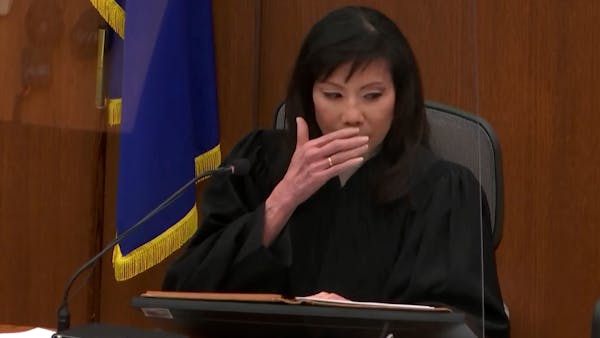Former Brooklyn Center police officer Kimberly Potter was sentenced Friday to two years in prison for fatally shooting Daunte Wright, a decision handed down by a judge who fought tears as she called the case the saddest of her career.
The sentence is about 3½ times lower than the presumptive prison term — a little over seven years — recommended by state sentencing guidelines for a defendant like Potter convicted of first-degree manslaughter and with no criminal history. Hennepin County District Judge Regina Chu said the lower term was appropriate because Potter was unlikely to reoffend, was not a threat to society and because she meant to use her Taser when she fired her handgun.
"In this case, a young man was killed because officer Potter was reckless," Chu said. "There rightfully should be some accountability. ... This case is highly unusual. ... This is a cop who made a tragic mistake."
Potter, 49, is expected to be released from prison on March 24, 2023, according to the Minnesota Department of Corrections (DOC). She has been in DOC custody since jurors convicted her in December of first- and second-degree manslaughter for killing Wright, 20, during a traffic stop on April 11, 2021. Inmates in Minnesota must serve two-thirds of their time before they are eligible for supervised release for good behavior.
In a rare courthouse sight, Chu wrestled with her emotions and struggled to speak toward the end of her remarks, saying the trial was "the saddest case in my 20 years on the bench.'' Wright's mother, Katie Wright, who has also identified herself as Katie Bryant, later criticized the judge, noting that Chu did not react to a victim-impact statement she gave at the hearing.
"Kim Potter murdered my son," Katie Wright said afterward. "Today the justice system murdered him all over again."
Wright's family also rejected tearful statements Potter made to them and the court before she was sentenced.
"To the family of Daunte Wright, I am so sorry that I brought the death of your son ...," Potter said through tears while looking at Wright's family in the courtroom. "... Katie, I understand a mother's love and I'm sorry I broke your heart."
Potter's sentencing began with an unusual move by prosecutors to distance themselves from two proposed aggravating factors they filed with the court in January — that Potter abused her position of authority and "caused a greater-than-normal danger" to others.
Police had stopped Wright for expired tags and a dangling air freshener and attempted to arrest him after they discovered an arrest warrant for carrying a gun without a permit. Wright broke free of an officer and slid back into the driver's seat, and after a brief struggle, Potter shot Wright. His car sped forward into another vehicle. Potter, who was captured on body camera video yelling "Taser, Taser Taser!" before firing, testified at trial that she believed she was deploying her Taser when she fired her handgun.
Assistant Minnesota Attorney General Matthew Frank told Chu on Friday that the media had reported that prosecutors filed the proposed factors in order to argue for a sentence that's longer than recommended by sentencing guidelines. However, the filing was made "because it's part of the trial process," he said, adding that the court was "free to consider that." But it's unheard of for prosecutors to file proposed aggravating factors without the intention of making an argument for a longer sentence.
Chu later said prosecutors had not proven either factor.
Frank asked Chu to impose the presumptive term recommended by sentencing guidelines. Potter's attorneys, Paul Engh and Earl Gray, asked for an unspecified lower term or probation.
"This is a very difficult case," said Frank, who also grew emotional as he addressed the court. "This is a courtroom full of pain and anger. How do we fix that?"
He talked about reaching a sentencing decision that would "help the Wright family through their pain and their loss" while also helping Potter "deal with the consequences of what she has done."
"She is in a unique position to make something of what happened for the betterment of a lot of people," Frank said, adding that Potter could speak to police and Taser manufacturers about weapon confusion.
Minnesota Attorney General Keith Ellison later issued a written statement asking the public to accept Chu's sentence.
"I don't ask you to agree with her decision, which takes nothing away from the truth of the jury's verdict," Ellison said. "I know it is hurtful to loved ones of Daunte Wright. I ask that we remember the beauty of Daunte Wright, to keep his memory in our hearts, and to know that no number of years in prison could ever capture the wonder of this young man's life."
Katie Wright and Wright's father, Arbuey Wright; his brother, Damik Bryant; his sister, Diamond Wright; and Chyna Whitaker, the mother of his 2-year-old son, gave victim-impact statements in court asking Chu for the longest prison term possible.
They remembered Wright for his big smile and his love of friends and family, including his son, Daunte Jr. They reminded Chu that whatever sentence she handed down, Potter would still be able to see her husband and two sons while they would never see Daunte again.
"I will never be able to forgive you for what you have stolen from us," Katie Wright said. "... She left our world with so much darkness and heartache."
Katie Wright said she blames herself because Wright had called her during the traffic stop and she told him things would be OK. She criticized Potter for smiling in a mugshot taken after her conviction. Engh later said Potter was instructed to smile by prison staff taking the picture, and that it was not meant to be disrespectful.
"Please keep in mind the impact this has caused her family and herself is just a small passing," Katie Wright told Chu. "It's just a small storm that's going to pass compared to our lives without Daunte."
Arbuey Wright told the court the birth of his son inspired him to become a better person, and that Potter, a 26-year police veteran, was trained to avoid weapon confusion.
"She was a police officer longer than my son was alive," he said.
Engh held up a box of letters from Potters' supporters and told the court she should receive probation or a lower prison term due to the strong support from her family, friends and some community members.
Potter has "lived a virtuous life," Engh said.
Potter has always been remorseful for her actions, he said. She has also been harmed physically and mentally from being isolated from other prisoners at the women's prison in Shakopee, and she would likely face continued isolation in prison because of safety concerns, he added.
"If you send her to prison you will harm her," Engh said.
Potter briefly addressed Wright's family and the court, crying as she begged for forgiveness.
"My heart is broken, devastated for all of you," Potter said to his family. "I pray for Daunte and all of you many, many times a day."
Potter also apologized to the city of Brooklyn Center.
Chu outlined her reasoning before announcing the sentence, keeping her composure until the very end.
The judge said she received "hundreds" of support letters from Potter's family members and friends, community leaders and others. She expressed her condolences to Wright's family, but also said Potter "honorably served her community" and "consistently went above and beyond the call of duty."
Potter's case diverges from other instances of Minnesota officers killing civilians on the job and other first-degree manslaughter killings motivated by "personal animosity," Chu said. That fact, among others, the judge said, merited a lower prison term.
"That I granted a significant downward departure does not in any way diminish Daunte Wright's life," she said. "His life mattered."
Chu's voice broke as she read a passage about empathy, and she appeared on the verge of tears after talking about the dangers of police work.
"Officer Potter made a mistake that ended tragically," Chu said. "She never intended to hurt anyone."

Want to share info with the Star Tribune? How to do it securely

'Safe recovery sites' would offer syringes, naloxone and more to people using drugs. The plan could be in peril.
New Minnesota GOP leaders seek peace with party's anti-establishment wing

Who is Republican Lisa Demuth, Minnesota's first House speaker of color?


